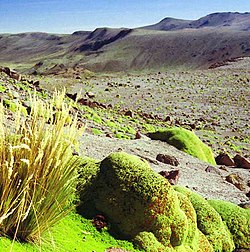Azorella compacta
| Den här artikeln har skapats av Lsjbot, ett program (en robot) för automatisk redigering. (2014-06) Artikeln kan innehålla fakta- eller språkfel, eller ett märkligt urval av fakta, källor eller bilder. Mallen kan avlägsnas efter en kontroll av innehållet (vidare information) |
| Azorella compacta | |
 | |
| Systematik | |
|---|---|
| Domän | Eukaryoter Eukaryota |
| Rike | Växter Plantae |
| Division | Kärlväxter Tracheophyta |
| Klass | Tvåhjärtbladiga blomväxter Magnoliopsida |
| Ordning | Araliaordningen Apiales |
| Familj | Flockblommiga växter Apiaceae |
| Släkte | Azorella |
| Art | Azorella compacta |
| Vetenskapligt namn | |
| § Azorella compacta | |
| Auktor | Phil. |
| Synonymer | |
| Laretia yareta (Hauman) Mathias & Constance Laretia compacta (Phil.) Reiche Azorella yareta Hauman Azorella prismatoclada Domin Azorella columnaris H.Wolff | |
Azorella compacta[1] (spanskt namn: llareta eller yareta) är en sydamerikansk flockblommig växtart som beskrevs av Rodolfo Amando Philippi. Azorella compacta ingår i släktet Azorella och familjen flockblommiga växter.[2][3] Inga underarter finns listade i Catalogue of Life.[2]
Bildgalleri
Källor
- ^ In: Anales Mus. Nac. Santiago de Chile 8: 28., 1891
- ^ [a b] Roskov Y., Kunze T., Orrell T., Abucay L., Paglinawan L., Culham A., Bailly N., Kirk P., Bourgoin T., Baillargeon G., Decock W., De Wever A., Didžiulis V. (ed) (28 januari 2014). ”Species 2000 & ITIS Catalogue of Life: 2014 Annual Checklist.”. Species 2000: Reading, UK. http://www.catalogueoflife.org/annual-checklist/2014/details/species/id/9467987. Läst 26 maj 2014.
- ^ Umbellifers: World Umbellifer Database
Externa länkar
 Wikimedia Commons har media som rör Azorella compacta.
Wikimedia Commons har media som rör Azorella compacta. Wikispecies har information om Azorella compacta.
Wikispecies har information om Azorella compacta.
Media som används på denna webbplats
Robot icon
Författare/Upphovsman: Valéry Fassiaux, Licens: CC BY-SA 2.5
Azorella compacta in Peru on the road between Arequipa and Chivay, a little bit before the "Mirador de los Andes pass", elevation of 4,910 m.
Författare/Upphovsman: Pedro Szekely from Los Angeles, USA, Licens: CC BY 2.0
Yareta (Azorella compacta, also known as Azorella yareta in the past) is a tiny flowering plant in the family Apiaceae native to South America, occurring in the Puna grasslands of the Andes in Peru, Bolivia, Chile and the west of Argentina at between 3200 and 4500 metres altitude.
Yareta is an evergreen perennial being in leaf all year. The pink or lavender flowers are hermaphrodite (have both male and female organs) and are pollinated by insects. The plant is self-fertile.
The plant prefers light (sandy) and well-drained soils. It can grow in nutritionally poor environments, no matter if the soil is acidic, neutral or basic (alkaline). Yareta is well-adapted to high insolation rates which are typical of the highlands, and cannot grow in shade. The plant grows in a very compact way in order to reduce heat losses and very close to ground level where air temperature is one or two degrees Celsius higher than the mean air temperature, this is due to the longwave radiation re-radiated by the soil (which is usually dark gray to black in the Puna).
The plan grows at a rate of approximately one millimeter per year, and thus many yaretas are over 3,000 years old.Författare/Upphovsman: Jason Hollinger, Licens: CC BY 2.0
Neat wildflower at high elevation on Alto Plano in Argentina, called "yareta". Forms these cool big old mounds o' flower. It looks remarkably like New Zealand's "vegetable sheep" (Raoulia spp.) and somewhat like purple saxifrage (Saxifraga oppositifolioa) in the Pacific Northwest and Canadian arctic. Interestingly, all three are completely unrelated: yareta is a carrot, vegetable sheep is an aster, and the saxifrage (obviously) is a saxifrage.
Författare/Upphovsman: Valéry Fassiaux, Licens: CC BY-SA 2.5
Azorella compacta in Peru on the road between Arequipa and Chivay, a little bit before the "Mirador de los Andes pass", elevation of 4,910 m.
Författare/Upphovsman: Albert Backer, Licens: CC BY-SA 3.0
Yareta with flowers, Vale de las Rocas, Bolivia
Författare/Upphovsman: Ingen maskinläsbar skapare angavs. Professorbikeybike~commonswiki antaget (baserat på upphovsrättsanspråk)., Licens: CC BY-SA 2.5
Azorella compacta
Photo taken by Professor Bikey Bike, May 2002, on the slopes of Nevado Coropuna, Peru.











